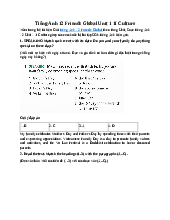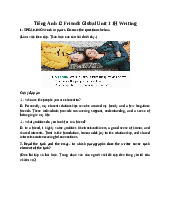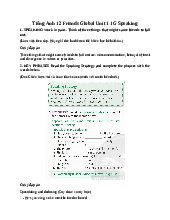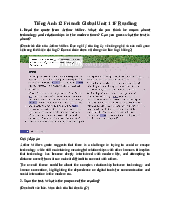




Preview text:
Tiếng Anh 12 Friends Global Unit 1 1A Vocabulary
1. SPEAKING Work in pairs. What do you think is the difference
between immediate family and extended family? Which family members would you include in each group?
(Làm việc theo cặp. Bạn nghĩ gì về sự khác biệt giữa gia đình ruột thịt và gia đình nhiều
thế hệ? Những thành viên nào trong gia đình bạn sẽ bao gồm trong mỗi nhóm?) Gợi ý đáp án
Immediate family consists of parents, siblings, and children, while extended family
includes a broader circle of relatives such as aunts, uncles, grandparents, cousins, and in- laws
2. VOCABULARY Check the meaning of the phrases below. Choose three family
members and describe your relationship with them.
(Kiểm tra ý nghĩa của các cụm từ dưới đây. Chọn ba thành viên trong gia đình và mô tả
mối quan hệ của bạn với họ.) Gợi ý đáp án
A: I deeply admire my older sister.
B: I have a lot in common with my cousin.
A: I trust and respect my father.
3. Listen to a teenager, Katie, talking about her relationships. Correct the mistakes
in this 'social circle' diagram.
(Hãy lắng nghe Katie, một thiếu niên, nói về các mối quan hệ của cô ấy. Hãy sửa những
lỗi sai trong sơ đồ 'vòng tròn xã hội' này.) Gợi ý đáp án Đang cập nhật
4. Now listen again to Katie and three more teenagers. Choose the correct answers.
(Bây giờ hãy nghe lại Katie và ba thiếu niên nữa. Chọn những đáp án đúng.) Gợi ý đáp án Đang cập nhật
5. VOCABULARY Work in pairs. Check the meaning of the verbs below.
(Làm việc theo cặp. Kiểm tra ý nghĩa của các động từ dưới đây.) Gợi ý đáp án
- compliment (sb on sth): khen ngợi ai đó về điều gì đó
- flatter (sb): nịnh hót ai đó
- insult (sb): xúc phạm ai đó
- lecture (sb about sth): truyền đạt kiến thức cho ai đó về điều gì đó
- nag (sb about sth): rầy la ai đó về điều gì đó
- offend (sb): xúc phạm ai đó
- praise (sb for sth): khen ngợi ai đó
- tease (sb about sth): chọc ghẹo ai đó về một điều gì đó
- tell (sb) off (for sth): mắng mỏ ai đó về điều gì đó
- warn (sb about sth): cảnh báo ai đó về điều gì đó
6. Listen to five dialogues. Choose a verb from exercise 5 and write down what is
happening in each dialogue. Use the passive.
(Nghe năm đoạn hội thoại. Chọn một động từ từ bài tập 5 và viết ra điều gì đang xảy ra
trong mỗi đoạn hội thoại. Sử dụng thể bị động.)
In dialogue 1, a man is being teased.
(Trong đoạn hội thoại 1, một người đàn ông đang bị trêu chọc.) Gợi ý đáp án Đang cập nhật
7. SPEAKING Work in pairs. Use verbs from exercise 5 to ask and answer
questions about things that have happened to you.
(Làm việc theo cặp. Sử dụng các động từ ở bài tập 5 để hỏi và trả lời các câu hỏi về
những sự việc đã xảy ra với bạn.) Gợi ý đáp án
A: When was the last time you were warned about something important?
B: Well, my mom warned me about staying out too late last weekend. She was concerned for my safety.
A: Have you ever been insulted by someone, and how did you handle it?
B: Yes, unfortunately. A classmate insulted me last month, but I tried to stay calm and
talked to them about why it bothered me.
A: Can you share a recent experience when you were complimented by someone?
B: Sure! My boss complimented me on my excellent presentation skills during our team
meeting last week. It felt great to receive positive feedback.




